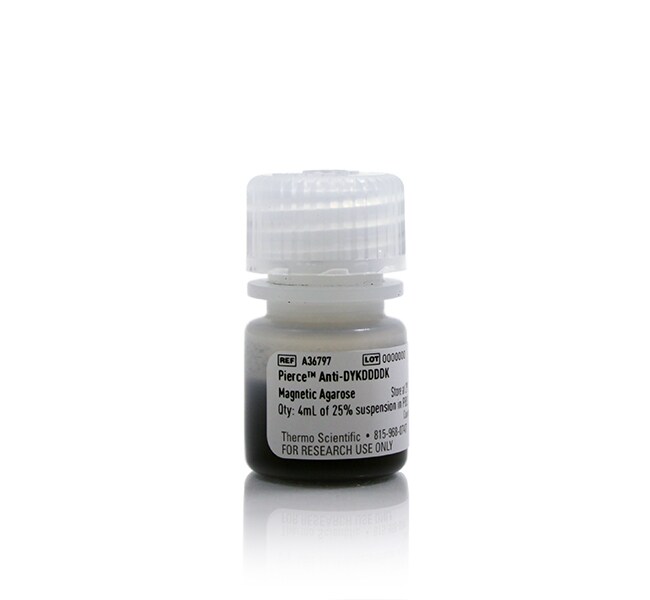Search

Pierce™ Anti-DYKDDDDK Magnetic Agarose
| Catalog Number | Quantity |
|---|---|
| A36797 | 4 mL |
| A36798 | 20 mL |
Thermo Scientific Pierce Anti-DYKDDDDK Magnetic Agarose provides a fast, convenient method for purification and immunoprecipitation (IP) of DYKDDDDK-tagged proteins from in vitro protein expression systems, bacteria, yeast, and mammalian cells. The amino acid sequence DYKDDDDK, commonly known as 'FLAG', is recognized by a high-affinity rat monoclonal antibody (clone L5) that is covalently attached to a magnetite-embedded agarose core particle.
For protein purification, the magnetic agarose is added to a sample containing DYKDDDDK-tagged proteins with the tag on either the N- or the C-terminus. Captured proteins are then magnetically separated from the supernatant, and non-specifically bound proteins can be washed away before dissociating bound DYKDDDDK-tagged proteins with elution buffer. The magnetic agarose is removed from the solution using a magnetic stand or an instrument such as the KingFisher Flex Magnetic Particle Processor. Automated instruments are especially useful for higher throughput purifications and screening of purification conditions.
Features include:
- Specific—unique base beads and highly specific antibody minimizes off-target binding (low non-specific binding)
- High purity—optimized bind-wash-elute protocol enables high purity
- High yield—special antibody conjugation method enables high yield
- Rapid—entire purification protocol typically takes less than 40 mins
- Economical—purification protocol allows multiple reuses
- Versatile—beads are compatible with manual and automated workflows (e.g., KingFisher instruments)
Characteristics of Pierce Anti-DYKDDDDK Magnetic Agarose:
- Composition: anti-DYKDDDDK antibody covalently attached to a magnetic, highly crosslinked agarose support
- Magnetization: ferrimagnetic with low remanence
- Bead size: 10–40 μm
- Bead concentration: 25% slurry in phosphate buffered saline, 0.01% Tween-20 detergent, 0.02% sodium azide, pH 7.2
- Binding capacity: ≥3.2 mg DYKDDDDK-tGFP-His protein (∼32 kDa)/mL settled beads
Store at 2–8°C.